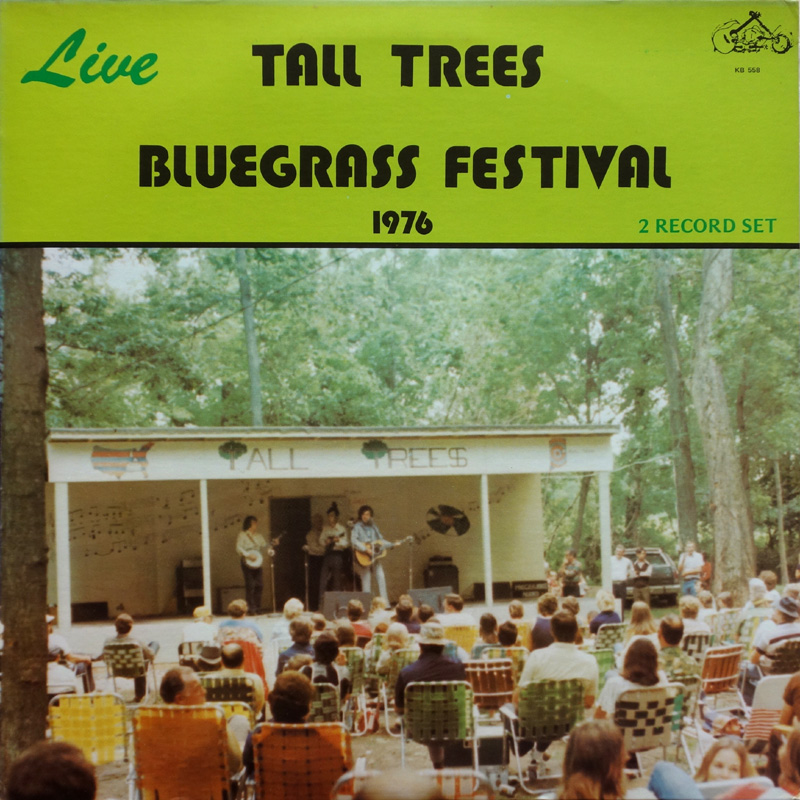- Bill Gatton Chevy Show
- Carter Stanley Interview - 1966
- How Far To Little Rock? - Search live shows
- Jim Kent's film 'Ralph Stanley's Bluegrass Festival'
- New WCYB Recording
- Pound Va. 1972 - Video
- Replica Rebel T-Shirt
- R.I.P. Ralph
- Roy Lee Centers Last Show
- Song & Memory Books
- Stanley Brothers - WCYB Acetate
- Stanley Standard - Carter Stanley Memorial Issue
- Suwannee River Jamboree
- Up In The Cloud - 1957-62
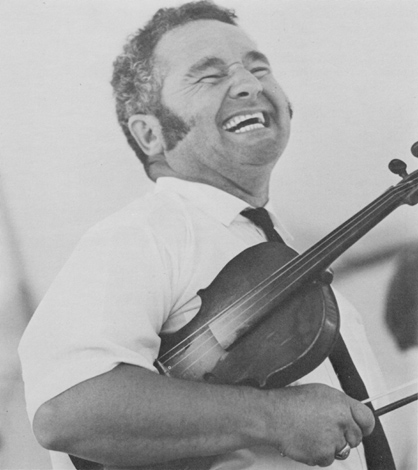
Curly Ray Cline
by Kathleen L. Stanton
This is an interview with Curly Ray Cline that was published in the Apr. 1975 edition of the now defunct 'Pickin' Magazine.
It isn't hard picking out 'Curly' Ray Cline amongst the other Clinch Mt. Boys. He plays the fiddle. But his personality is just as noticeable. Curly is usually the one whose high spirits and good-natured impudence help get the crowd smiling... then chuckling... and finally roaring for more.
Born in the mountainous Mingo County, West Virginia, 'Curly' Ray Cline first stepped on stage in a fiddle contest in Williamson, West Virginia, at the age of thirteen. Only a few years later, he helped organize the Lonesome Pine Fiddlers, made up of his brothers and cousins Ned, Ezra, Charlie, renowned mandolin player Paul Williams,[1] and Ray himself.
Curly: My daddy was an old-time fiddler, and I just followed him, and a fiddle player named Arhur Smith (from the Grand Ole Opry). I just called it mountain fiddlin' back then. I guess it would be called bluegrass today.
Pickin: Did your father teach your brothers how to fiddle?
Curly: They followed me and then my father, too. They weren't like me: they played a little bit of everything. Charlie played all the instruments pretty good... to get by... and Ned the same way.
Pickin: Who are some of your early country and bluegrass favorites?
Curly: I always did like Bill Monroe's style of music. I heard him when he was with Charlie back when I was just a kid. I like the Delmore Brothers and the Blue Sky Boys.
Pickin: When did the Lonesome Pine Fiddlers get organised?
Curly: We were organised in Bluefield, West Virginia - WHIS, Bluefield - in the late thirties and early forties. We played mostly what I call, mountain music. We did vocals, and we did fiddle tunes, some twin fiddlin'... and we used the tenor banjo back then; the five string wasn't too popular. My brother Ned used the tenor banjo.
Although Ray sings very infrequently these days - 'my voice is pretty weak now', he says - he sang baritone when he was with the Lonesome Pine Fiddlers.
Because old 'Fiddlers' albums are so scarce, Ray's versatility as a song writer remains unknown to many. He has, in fact, written numerous songs, both for the Lonesome Pine Fiddlers and the Goins Brothers (Melvin and Ray). Many of thse tunes are on his solo albums.
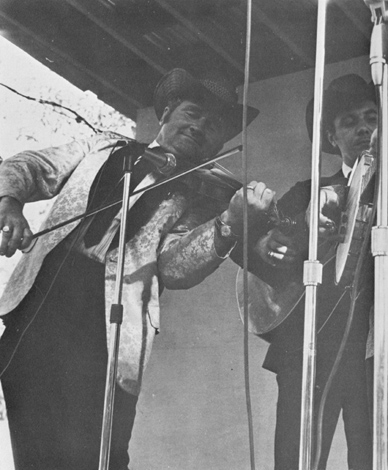
Pickin: I wrote Windy Mountain, I'll Never Make You Blue, Brown-Eyed Darlin'. Paul Williams and I wrote I'll Never Change Your Mind, You Broke Your Promise, Death Came Creepin' In My Room and He Won't Accept No Excuses. I wrote Lonseome Pine with Mike Paxton, a disc-jockey there in Pikesville. Those were mostly songs, I also wrote several instrumentals. Well... you can hear them on my albums. They're old and I re-arranged them. You take a fiddle tune, they'll be ten fiddlers playing it. It can be the same tune and it still won't sound alike - it'll sound different with each fiddler. I just change a tune so it works a little better for me, for my style - which I just call Old-timey.
The Lonesome Pine Fiddlers moved from Bluefield to Oak Hill, West Virginia in the fall of 1952, playin on WOAY radio. In January, 1953 the band moved to Michigan.
Curly: We were on the Big Barn Frolic on Saturday night. It was on WJR radio in Detroit. We had a pretty good thing goin' there for about a year. Paul Williams was with us. Paul cut several of the early records on RCA Victor. He was with us around eight months 'fore he left. Then he went with Jimmy Martin. Paul was really the main singer with the 'Fiddlers. We sold more records with Paul Williams than with any other singer. Paul was just a kid when he was recording for us.
Pickin: When you were in Michigan, did you get a chance to meet any of the local Michigan groups?
Curly: Yeah, we met the Davis Sisters and helped them make their audition on a little label called Fortune. We were on RCA Victor and we helped them get on the Victor label.[2]
In mid-1953, the Lonesome Pine Fiddlers beat a path back to the hills of Pike County, Virginia. They worked on a little radio - WLSI, Pikeville, Kentucky - for about three years. It was at this time that the Goins Brothers joined Ray and Ezra to make up the group. The four worked on television, made many personal apppearances, and recorded several sides for Victor.
The Melvin and Ray Goins, Ezra and Ray Cline version of the Lonesome Pine Fiddlers broke up in April, 1955 (although the group did continue briefly with Ezra and others). Curly stopped playing full-time and went to work in a coal mine owned by his brother-in-law and himself. He stayed in the coal mining business until 1961.
Curly: I didn't do too much playin' then. That's what I was a-workin' and just part-time playin'. I had a little truck mine. I ran coal... just to get by... there wasn't very much money.
I was in the coal mines through that war (World War II). I was turned down by the army - I had one brother, Ned, that got killed in I b'lieve, '41.[3] I was in there I reckon, around '40 til '46. I hand-loaded coal. It was quite a time. It was a big union mine. Peter White Coal Company, out of Bluefield, West Virginia. They started me off on what they call the 'Hoot-Owl Shift' - the graveyard shift.
Pickin: I heard it termed stronger than that.
Curly: (Laughter) Yeah. The you work yourself down. You stay maybe a year on that, then you get the evenin' shift. Then at last you get the day shift - about the third year.
Pickin: Is working in the mines the reason you rarely sing now?
Curly: Well, that has a lot to do with my voice. The coal dust does something to your voice, it gets in your lungs. 'Course, our family never was real singers. I mean, we just got by - mostly instrumental, you know. That dust will follow you to your grave. There's nothin' much you can do about it.
Pickin: Did you ever belong to the coal miner's union?
Curly: Yeah, I belonged to the union. I've got enough time to draw this Black Lung (disability pension) when I retire. I can't draw it long as I'm workin' like I am now. I don't think we'll ever have another John L. Lewis (the first president of the United Mine Workers Association). I think the union has slipped, I think, since he left. The miners don't take as much interest now as when Lewis was in. You know, they really went out for it. I know I walked maybe four or five miles across the mountains just to go the union meeting when John L. Lewis was in. Everybody just really loved him, and they believed in him. I guess they believe in Arnold Miller (the present UMWA leader), but not like they did Lewis.
You take coal minin' out of the place where me and Keith... all the band is from... and it'd just be a dead country. There's just not enough work around here to keep it a-goin'. I'm not agin' strippin' (strip mining) too much if they'd do what they claim they do to fix the land up. They just don't do what the law tells them to do.
Pickin: The years during your time as a coal miner was a period of personal misfortune. Would you talk for a moment about that?
Curly: It was in that '57 flood, and I lost a lot of the stuff there - very important things that I can't buy back. We got caught right in the middle of that, and just about lost everything... I had a trailer, a house trailer, and it (the flood) did everything but wash it off. What was left wasn't much.
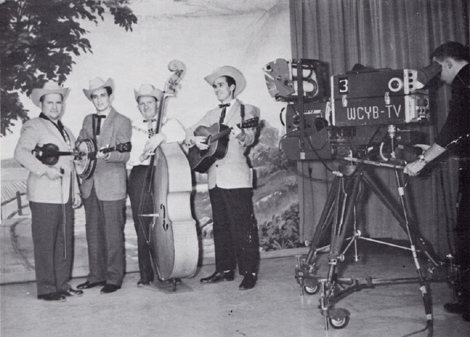
Pickin: Were you at home when the flood happened?
Curly: Oh yes! I had to run up the hill to escape the water - it almost got us! It was late afternoon, almost four o'clock when it started crestin' at one forty-five the following of the river, and they said they didn't think there was any danger. After, the water got so high - it split in two up by the radio station - part of it came down the road and part of it was in the main river. It caught my family in between. We tried to cross the road and then's when it got the car. My wife had to grab the baby and a friend grabbed the wife. She was on the right - downhill - side, and he pulled her across. It almost got me. I opened the door and it was up above my knees. There was cattle bawlin', there was barns goin' - just about eveythin' was hit.
Pickin: I'm glad nobody was hurt.
Curly: I'll tell you, we were lucky. I don't believe anyone lost his life. With all the damage it done, it was just like the good Lord was with everybody, and he sort of changed the route.
Pickin: Where did you go after you abandoned your home?
Curly: We went to this home up on a hill and the man livin' there said, "Now I don't have too much, but what I've got we'll eat it. As long as I've got something, y'all can have it." Later on, we got an old piece of a pole-axe and went up in the hills to try and break wood. The gas and the juice (electricity) was off - all the lines was cut off. We heard the transformer to the radio station blow up. It looked like a bald streak of fire when that transformer went. All our instruements were at the station. When the water went down, the only thing we could see was that bass fiddle goin' around and around - it stayed right on top of the water. It was the only instrument that was saved. My fiddle was just in pieces.
We just stayed with other people up and down the river, and I used that truck from January 'til April 'fore I was able to get back house-keepin' like I was before.
Pickin: When did you first meet the Stanley Brothers?
Curly: The Stanley Brothers organized a band just about when the Lonesome Pine Fiddlers did. They were on a little station in Bristol, Virginia, called 'Farm and Fun Time'. We were on in Bluefield - about seventy-five or eighty miles away. We played several shows together. We were practically raised up together. Carter, Ralph and I... and the Lonesome Pine Fiddlers.
Pickin: When did you start playing with Ralph and Carter?
Curly: In 1966, I had worked part-time with Ralph and Carter about six months before Carter died. The other part of the time I was in the mines. Ralph gave me a regular job after Carter died, and I've been with him ever since.
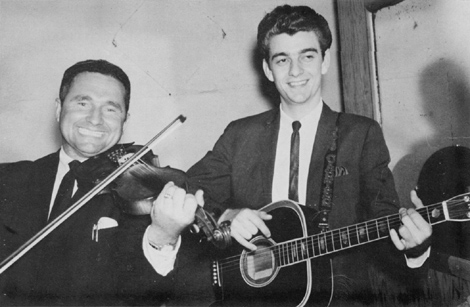
Pickin: When did you record your first album with Ralph?
Curly: In 1968 - the second year I was with him. It was on the Melody label. The second one was on Jalyn. The ones now are on Rebel Records.
Pickin: Are you working more now than when you first started with Ralph?
Curly: Yes. When I first started with Ralph we weren't working in over four or five states. But when the festivals began and started spreadin' out, we started spreadin' out, too - followin' 'em. Before, we would leave, maybe, on Thursday or Friday and get back Sunday night or Monday - we didn't have over two, three hundred miles to go.
Pickin: What do you do with your spare time, if you have any these days?
Curly: (Chuckling) Well, I don't have too much spare time. I foxhunt some, and I garden some. I fish some but I'd rather hunt. On the average I'm home two to three days a week.
Pickin: I recall the first year Ralph had a festival you had a fox hunt...
Curly: A fox-race, that's right. Ralph had ordered the fox, and it was late a-comin'. If we'd a-had it in the open it could've limbered up. But that poor fox, it was pitiful, when we let it out it couldn't outrun a 'possum! We had about twelve - fifteen big hounds there, and they just dodged here and yonder. A fox, they're kind of like a deer, they can really go. I don't know what happened to it, it got away or somethin'. The dogs went after another fox and they were out there all night long. (laughter) It was a pretty good night!
Pickin: I remember the hounds baying, taking off down the hollow...
Curly: (Laughter) Yeah, and them women screamin'. Ralph said it was a shame to turn a little fox loose 'mongst all them dogs. He didn't want to see it killed. It was a beautiful fox. I'd hate to seen it! It was about a year old and real pretty. Now, if it'd been just a real good fox race I think it would'a been good. But the way it happened, it just wasn't no race at all. You could've just rolled an old rock down the hill, or turned a 'possum loose - it wouldn't have been much difference because the fox just couldn't run.
Pickin: Is there any difference in the way you play with Ralph and the way you played with the Lonesome Pine Fiddlers?
Curly: I played the same way with the Stanley Brothers, when Carter was livin', as I did with the Fiddlers. I was workin' in the mines most of the time and hadn't caught on to their style. It was like startin' all over again when I went with Ralph. His sound was more old-timey than the way we (the Fiddlers) played it. It was pretty easy for me to catch on and now (he chuckles) I don't know whether I could play the other style. It's hard to explain, but it's different - just a different sound. Ralph is one of the tops when it comes to entertainment. He's a good banjo player and songwriter, too.
Pickin: I imagine playing music is a lot better than mining coal.
Curly: The playin' is really a pleasure - but that travellin' gets kind of on you. I love to play - to get out there and entertain the people.
by Kathleen L. Stanton

[1] Article says "fiddler" but this is an error. Paul Williams played guitar and sang on three sessions with the Lonesome Pine Fiddlers according to Gary Reid's liner notes to the excellent CD retropective 'Windy Mountain' (Bear Family BCD 16351 AH) 1992.
[2] The 2xCD Davis Sisters - 'Memories' (Bear Family BCD 15722 BH) 1993 includes ten cuts which feature backing by The Lonesome Pine Fiddlers, but the musical style is vocal harmony country, very different to the 'Fiddlers own releases.
[3] Ireland 'Lazy Ned' Cline was killed 1st Aug 1944 during the D-Day invasion of Normandy, France: http://clinefamilyassociation.com/clines__bluegrass_music

